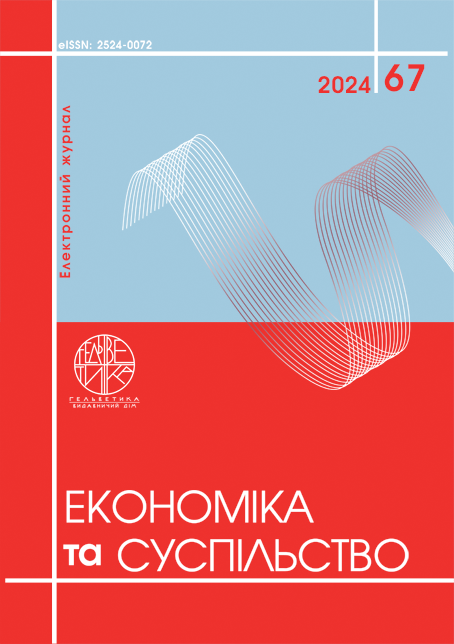DIGITALIZATION AND DECARBONIZATION: ASPECTS OF SYNERGY IN THE EU INDUSTRIES
Abstract
The article explores the synergy between digitalization and decarbonization within the EU’s most carbon-intensive industries, with a particular focus on the green transition in the energy sector. The study examines the EU’s twin transition experience, highlighting the role of digital technologies as key drivers for a climate-neutral economy. Through an analysis of digital applications in energy and industrial production, the authors identify crucial digital solutions, including smart grids, AI, and big data, that accelerate decarbonization efforts. The article provides a comprehensive review of EU initiatives, showcasing successful examples of green and digital integration to reduce greenhouse gas emissions. Key areas of synergy between decarbonization and digitalization are emphasized, illustrating how the twin transition not only reduces emissions but also improves resource efficiency and resilience to climate-related challenges. The paper organizes digital practices across EU sectors and proposes models that may serve as frameworks for building a global climate-neutral economy.
References
. IPCC (2021). Climate Change 2021: The Physical Science Basis. Contribution of Working Group I to the Sixth Assessment Report of the Intergovernmental Panel on Climate Change. Cambridge University Press.
International Energy Agency [IEA] (2023). World Energy Outlook 2023. Available at: https://www.iea.org/reports/world-energy-outlook-2023
Newman, R., Noy I. (2023). The global costs of extreme weather that are attributable to climate change. Nature Communications. Т. 14. №. 1. pp. 6103. DOI: https://doi.org/10.1038/s41467-023-41888-1
Iizumi, T., Shen, Z., Furuya, J., Koizumi, T., Furuhashi, G., Kim, W. and Nishimori, M. (2020) Climate change adaptation cost and residual damage to global crop production. Climate Research. Т. 80. №. 3. pp. 203–218. DOI: https://doi.org/10.3354/cr01605
European Commission (2022). Twinning the green and digital transitions in the new geopolitical context. Publications office of the European Union, 2022. DOI: https://doi.org/10.2792/022240
Maksymova, I., Mietule, I., & Kulishov, V. (2023). Digital Solutions for a Climate Neutral Economy: International Framework of Eco-Digital Projects. In ENVIRONMENT. TECHNOLOGIES. RESOURCES. Proceedings of the International Scientific and Practical Conference (Vol. 1, pp. 123–127).
McKinsey (2020). The future of work in Europe: Automation, workforce transitions, and the shifting geography of employment. Available at: https://www.mckinsey.com/featured-insights/future-of-work/the-future-of-work-in-europe
Bauer, P., Stevens, B., & Hazeleger, W. (2021). A digital twin of Earth for the green transition. Nature Climate Change, 11(2), 80–83.
Nativi, S., Mazzetti, P., & Craglia, M. (2021). Digital ecosystems for developing digital twins of the earth: The destination earth case. Remote Sensing, 13(11), 2119.
Mondejar, M. E., Avtar, R., Diaz, H. L. B., Dubey, R. K., Esteban, J., Gómez-Morales, A., ... & Garcia-Segura, S. (2021). Digitalization to achieve sustainable development goals: Steps towards a Smart Green Planet. Science of The Total Environment, 794, 148539.
Geels, F. W., Sovacool, B. K., Schwanen, T., & Sorrell, S. (2017). Sociotechnical transitions for deep decarbonization. Science, 357(6357), 1242–1244. DOI: https://doi.org/10.1126/science.aao3760
Victor, D. G., Geels, F. W., & Sharpe, S. (2019). Accelerating the low carbon transition. The case for stronger, more targeted and coordinated international action. Brookings.
Midttun, A., & Piccini, P. B. (2017). Facing the climate and digital challenge: European energy industry from boom to crisis and transformation. Energy Policy, 108, 330–343.
Argyriou, A. S., Lyzun, M., Lishchynskyy, I., Savelyev, Y., Kuryliak, V., Ivashkiv, I., & Sachenko, S. (2021). Modeling the Stabilization Factors of Monetary Unions in turbulent economics. In 2021 11th IEEE International Conference on Intelligent Data Acquisition and Advanced Computing Systems: Technology and Applications (IDAACS) (Vol. 2, pp. 749–754). IEEE.
Hao, X., Li, Y., Ren, S., Wu, H., & Hao, Y. (2023). The role of digitalization on green economic growth: Does industrial structure optimization and green innovation matter? Journal of environmental management, 325, 116504.
Ren, S., Li, L., Han, Y., Hao, Y., & Wu, H. (2022). The emerging driving force of inclusive green growth: does digital economy agglomeration work? Business Strategy and the Environment, 31(4), 1656–1678.
Global Carbon Budget (2023) – with major processing by Our World in Data. "Annual CO₂ emissions – GCB" [dataset]. Global Carbon Project, "Global Carbon Budget" [original data].
DIGITALEUROPE. (n.d.). The voice of digitally transforming industries in Europe. Available at: https://www.digitaleurope.org/
Victoria, M., Zhu, K., Brown, T., Andresen, G. B., & Greiner, M. (2020). Early decarbonization of the European energy system pays off. Nature Communications, 11(1), 6223. DOI: https://doi.org/10.1038/s41467-020-20015-4
IRENA (2023). Renewable power generation costs in 2022, International Renewable Energy Agency, Abu Dhabi.
EU Briefing (2022). EU can stop Russian gas imports by 2025: Accelerating clean energy avoids fossil lock-in. Bellona Europe, Ember, RAP, & E3G. Available at: https://ember-climate.org/app/uploads/2022/03/EU-can-stop-Russian-gasimports-by-2025.pdf
Oliveira, A. M., Beswick, R. R., & Yan, Y. (2021). A green hydrogen economy for a renewable energy society. Current Opinion in Chemical Engineering, 33, 100701.
Borowski, P. F. (2021). Digitization, digital twins, blockchain, and industry 4.0 as elements of management process in enterprises in the energy sector. Energies, 14(7), 1885.
Allied Market Research. (2022). Energy as a Service (EAAS) Market Analysis-2021. Available at: https://www.alliedmarketresearch.com/energy-as-aservice-eaas-market-A06878
Copyright (c) 2024 Ірина Максимова, Віталіна Куриляк

This work is licensed under a Creative Commons Attribution 4.0 International License.


